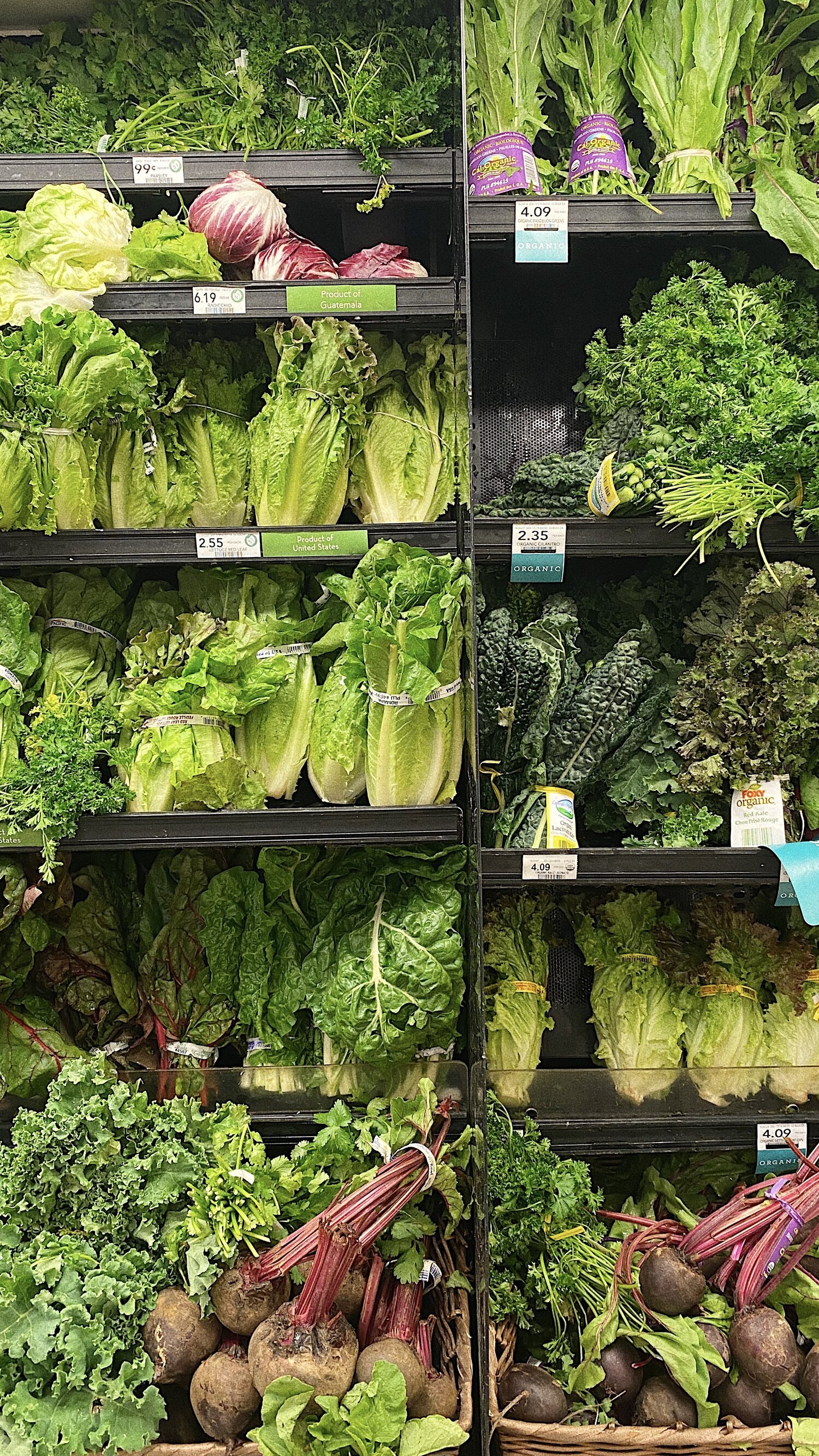tips for beginning to transition to a plant-based diet
written by Jasmine Irven
This blog post was originally written as a guest blog for Urban Body Fix! Check out the original post here.
“Plant-based” has become quite the buzzword over the past few years and for good reason! More and more people are recognizing the benefit and importance of including more plants in their diet -- for both mental and physical health and wellbeing.
If you’re looking to include more whole, plant-based foods into your diet, it’s important to do so in a way that’s sustainable, rather than overwhelming. That encourages you to continue making gradual changes, rather than making drastic change for a week or two before inevitably reverting back to old patterns.
With that in mind, I’ve outlined some tips for beginning to transition to a plant-based diet. These are all things you can do starting immediately, and can be customized completely based on your level of comfort, and current lifestyle!
I hope to encourage you to recognize that a plant-based lifestyle doesn’t need to be all or nothing. You don’t need to make drastic changes overnight or give up anything that you aren’t ready to. Chances are though, the more you begin to experiment with the options and flavours of this lifestyle, the more you’ll want to continue shifting!
What does it mean to be plant-based?
Let’s start with a few definitions just so we’re all on the same page here. It’s important to note that this is how I’m defining these terms for the purposes of this article - there is some variation in the general community.
Vegetarian: Someone who refrains from eating meat and fish but may consume eggs, dairy, and other animal by-products.
Vegan: Someone who refrains from consuming any animal products or by-products (generally no: meat, dairy, eggs, gelatin, honey). Vegans also generally extend this idea beyond their diet; avoiding animal products in every aspect of their lives (no leather, only using cruelty free products, etc.).
Plant-based: Those who are plant-based refrain from consuming any animal products or by-products (no meat, dairy, eggs, etc.), but may not extend this concept into their life beyond their diet. We also consider those who are plant-based to focus on consuming mostly whole-foods (foods like fruits, vegetables, and grains) that come directly from the earth, rather than those full of additives.
Unfortunately the line between these terms has become blurred, especially in recent years, as companies catch on that people are looking for plant-based options, but I hope this provides some clarity!
It’s really up to you what your diet looks like - you don’t need to define yourself based on a word or category like this if it doesn’t resonate. We’re all unique and our needs will look different from anyone else. But, if you find comfort in these definitions, feel free to use them as you see fit, or consider taking one and adapting it to suit your own needs.
For example, I refer to myself as mostly plant-based, and this is a totally arbitrary term I created for my own life. I’m someone who follows the plant-based guidelines about 95% of the time. I refrain from eating all meat, eggs, dairy, and other animal by-products the majority of the time, as well as avoiding overly processed foods when I grocery shop. However, if I’m at someone’s house and they make something forgetting I’m mostly plant-based that has an egg in it, I will likely still eat it. This allows me flexibility and prevents my diet from feeling overly restrictive, and it’s this level of comfort we should all be able to achieve in our diet! Making lifestyle choices that feel good to us individually.
Why consider shifting to a plant-based diet?
There are quite a few reasons why someone might opt for a plant-based diet, with the 3 main general motivations being:
To support personal health & healing
Plant-based diets are associated with reduced risk of chronic disease, improved longevity, and improved nutritional intakes relative to current recommendations of many vitamins and minerals.
As well, most plant-based foods are low in saturated fat, and all are completely cholesterol free. Plus they come packaged with fibre, and are some of the most concentrated sources of protective phytochemicals.
To promote reverence for life
Many opt to transition to a more plant-focused diet due to concern for animal rights, and there’s a lot to be said for this argument! Deciding to limit or avoid animal products and by-products is a strong statement against violence and cruelty toward animals.
To protect the environment
As sustainability becomes more of a concern and focus for so many of us, we’re often looking for ways we can make changes in our own lives. If you’ve made the switch to reusable water bottles, taking your own bags to the grocery store, taking shorter showers, and opting to walk when you can instead of driving, among other things, incorporating more plants into your diet might be a great next step to take!
Although there is much needed to be done at the policy, government, and corporation levels where most of the impact is made, becoming vegetarian or plant-based is considered the most effective step an individual can take toward reducing their ecological footprint as it assists in the preservation of water (which animal agriculture demands immense amounts of), helps prevent water pollution, preserves the planet's ecosystems (i.e. deforestation is linked often with clearing land to raise cheap beef for American fast-food establishments), and reduces global warming (raising livestock requires huge amounts of fossil fuels and a large percentage of methane emissions come directly from livestock).
How to begin to transition to a more plant-based diet
Now that I’ve covered a lot of the basics, and hopefully convinced you that eating more plants is something worth trying, let’s go over a few ways you could begin incorporating plant-based meals into your life.
In general, focus on crowding out, not cutting out. Add in more plant-based foods when you can and slowly you’ll start to notice your diet changing. Every step you take is powerful and makes an impact. It's much better to make this transition gradual, so you don't become overwhelmed with the changes and/or cravings. We want this change to be exciting and sustainable, not so challenging that you feel like you want to give up.
Not only that, but transitioning slowly is important for your health as well. Since plant-based foods are naturally high in fibre (which is super healthy!), if your system is not used to this you may experience bloating if you all of a sudden incorporate a bunch of plant-based, high-fibre foods into your diet.
To reduce potential discomfort as you transition, be sure to drink lots of water throughout the day, and go on a walk after meals! You may also want to consider taking a vegan digestive enzyme supplement after consulting your healthcare provider, if you're still experiencing a lot of bloating even with a gradual transition.
Ideas for how to transition:
Cut out animal “groups” one at a time. Start first with red meat, and then after a period of time (whether that’s weeks, months, or years), move to white meat, then fish, then eggs and dairy (if desired). You can take as long as you like at each stage, or completely skip a step if you’d like to.
Commit to something like meat-free Mondays and put a recurring reminder in your calendar!
Challenge yourself to make one vegan recipe a week, or to swap out something you regularly consume with a vegan version.
Follow some vegan foodie accounts on Instagram or Youtube for some inspiration.
Maybe set a rule that when you go out you can indulge in certain foods but you don’t purchase them for your house.
Purchase a plant-based cookbook and try to use it once a week.
Make some simple swaps with products you normally buy (consider starting by swapping yogurt for a similar coconut yogurt, or regular milk for oat milk or another plant-based nut milk, swap out butter for olive or avocado oil when cooking and milk chocolate for a vegan dark chocolate when cooking).
Know that there’s not one right way to do this, it completely depends on your lifestyle, your reasons for wanting to incorporate more plant-based foods into your life, and what resonates with you the most!
I hope this gave you some ideas, inspiration, and knowledge about a plant-based lifestyle, and that you can begin to implement some of these ideas into your daily or weekly routine.
Let me know in the comments if you begin to shift!
Sustainable Bliss Collective endorses products & brands we genuinely love and support. If you end up making a purchase through one of our affiliate links, it will not cost you anything but we may earn a commission. Learn more here.
about the author
Hey there! I’m Jasmine, founder of the Sustainable Bliss Collective, a Certified Meditation Teacher, and lover of all things self-care, slow-living, and personal development.
I believe that ambition and self-care can coexist, and as such I hope to encourage and inspire you to take care of yourself, breathe deeply, connect with who you are, manifest your dreams, enjoy the blissful moments of each day, and make an impact in this beautiful world we call home.
Connect with me on Instagram here!







